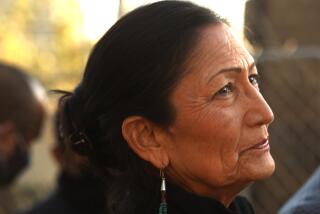Aleuts Will Make Plea for Custody of Baby Girl : Tribal rights: An appeals court will hear their arguments for raising the girl in Alaska. The mother, of Aleut descent, has offered the child for adoption by a Canadian couple.
- Share via
SANTA ANA — An Aleut Indian tribe heads for the 4th District Court of Appeal this week to argue that a 20-month-old girl with Indian blood should be placed with the Alaskan tribe.
The baby’s mother, Jodi Argleben, wants to give her daughter, Rebecca, to a Canadian couple for adoption. Argleben has vowed to appeal the case to the Supreme Court if necessary and said she will raise the child herself rather than see her sent to the Akhiok village on Kodiak Island.
“I visited them myself about a year and a half ago, and I would want better things for her,” Argleben said. “If I have to (raise Rebecca) I will. I’ll find some way to do it.”
Lawyers for the Aleut tribe argue that since Argleben has relinquished the child, she no longer has the absolute right to decide where the baby should be placed for adoption. They base their case on a federal law aimed at preserving Indian tribal integrity by giving tribes the right to intervene in the adoption of Indian children.
The Indian Child Welfare Act of 1978 explicitly grants tribes that ability in all child custody proceedings, including voluntary adoptions such as Argleben’s, the Aleuts’ lawyer, Jack F. Trope, argued in briefs filed with the appeals court.
But Argleben’s attorney, Christian R. Van Deusen, contends that the real issue in the case is the mother’s right to privacy in making procreative choices. Her right to chose whether to abort or carry the child, whether to give her up for adoption, and which couple should adopt her, can only be overruled if there is “an overriding state interest to be promoted,” Van Deusen says.
That state interest does not exist in this case, he argues, because “the child was not removed from an Indian family, tribe, nor an environment in which the Indian culture or heritage existed.”
Argleben was born in Akhiok, but she and her sister were adopted by a Cypress couple when Argleben was 2. She alleges that she was neglected and abused by alcoholic parents, an allegation the tribe denies.
Argleben also claims that her parents are each half Aleut and half Russian. The Aleut tribal leader, however, has declared that both her mother and her father were full-blooded Indians and that “if there was mixed blood in either of their ancestries, it would have to be several generations back.”
What is not in dispute is that when Argleben was a high school student, she became pregnant by a non-Indian classmate, and gave birth to Rebecca on June 10, 1989. When the tribe learned of the baby’s birth, it voted to recognize Rebecca as a member of the Akhiok tribe.
Argleben responded by resigning her tribal membership and eventually gave the child to a couple in Vancouver, B.C., where Rebecca remains. The tribe filed suit in British Columbia to contest the adoption.
The Canadian court ruled that it did not have jurisdiction over the matter, which should rightly be decided in California. However, the court also ruled that Rebecca had been brought to Canada in order to deprive the Akhiok tribe of its legal rights under American law. The Vancouver couple have appealed that decision, and the Canadian case is still pending.
Argleben returned to California and asked the Orange County Superior Court to approve the placement of Rebecca with the Canadian couple. Last February, Superior Court Judge Robert J. Polis reluctantly ruled that federal law entitled the Aleut tribe to intervene in the case. Polis said he sympathized with the plight of Indians and was obligated to uphold laws respecting their sovereignty.
The issue to be argued before the appeals court on Thursday is the narrow legal question of whether the Akhiok have the right to intervene. Whatever the appellate decision, the case will be sent back to Superior Court for hearings on who should adopt Rebecca.
If the case goes in her favor, said Argleben, now 20, Rebecca can reclaim her heritage if she wishes when she grows up.
“If she would like to go up there and see for herself, she could do so,” she said. “And if she decided to stay there it would be her own decision. She’d be old enough to choose a life for herself.”
Both Argleben and her father expressed bitterness at the tribe’s refusal to drop the case. Ernest Argleben said that although the legal bills are nearing $50,000, he will support his daughter all the way through a Supreme Court case if necessary.
“It’s not a question of money. It’s a question of principle,” the father said. “My daughter has made a choice. I think every woman should have a choice.”
Though adamant that she will not give up, Argleben said the 20-month legal battle has taken an emotional toll. “I want this thing to end,” she said. “Every time I have . . . a hearing like this it makes me think back to what I have given up so she can have better things in life.”
More to Read
Sign up for Essential California
The most important California stories and recommendations in your inbox every morning.
You may occasionally receive promotional content from the Los Angeles Times.













